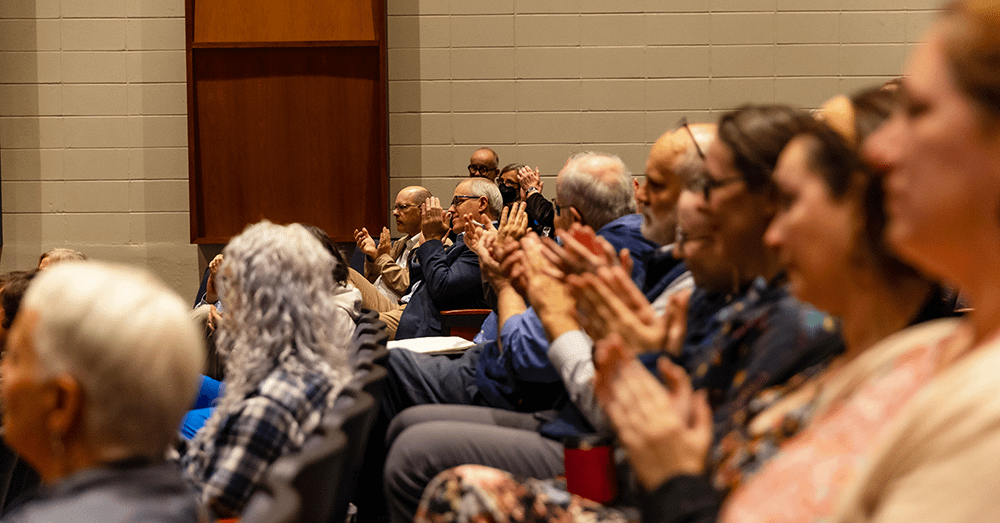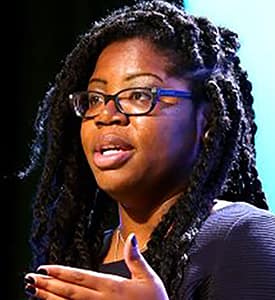Main Stage show ‘Mill Girls’ a labor of love and learning
Due to the popularity of this event, please arrive at least 30 minutes early if you wish attend. We hope to accommodate as many people as possible, but seating is limited, and available on a first-come, first-serve basis. Thank you.
A 14-member student cast at Saint Michael’s College started work on Labor Day, which felt appropriate, for a new original play with music about the lives of 19th century girls who worked the mills of New England towns like Lowell, MA, and Winooski, VT.
That rehearsal launched preparations still under way for performances on November 2, 3,4,10 & 11 at 7 p.m. in the McCarthy Arts Center Theater. All performances are free and open to the public.
Created and directed by St. Mike’s theater Professor Peter Harrigan, the show Mill Girls features an ambitious musical score by the well-established Burlington-area talent Tom Cleary, who long has been involved with Saint Michael’s Playhouse productions and many other local projects. Cleary will lead a small band for performances, including his wife, vocalist and teacher Amber DeLaurentis, Saint Michael’s Fine Arts Professor Bill Ellis on guitar, and Stan Baker on cello.
“Mill Girls” as a concept for this year’s history-charged and socially conscious “Mainstage” production at the College arose as Harrigan, now in his 27th year of teaching, looked for new ways both to challenge himself as a director and teacher and to model different artistic approaches for students, he said.
The resulting production has been a semester-long teaching tool across multiple disciplines on the Colchester campus. For example, at 4 p.m. on Thursday, October 19 in the McCarthy Recital Hall will be an “Academic Panel” discussing the issues presented by the play; Harrigan tapped a History Department colleague’s earlier research and knowledge as he wrote the play; and the student cast will present an abridged version of the play for Winooski school children based on lesson plans from colleagues in the College’s Education Department.
Harrigan said that in creating Mill Girls, he took the approach of creating a “collage” from primary sources, as he had observed and admired in earlier productions that he directed, including “The Laramie Project,” “Mad Forest,” and “Execution of Justice.” In each case, the authors used non-theatrical materials – newspaper articles, court transcripts, interviews, journal entries, to name a few – to examine historical incidents and create a script for a play, he said.
“When I directed these plays, I found that undergraduate actors were able to make a deeper connection to the emotional lives of the characters and the troubling incidents depicted in the plays, because it all ‘actually happened.’ With a theatrical collage project in mind, I searched for a story from the past that would speak to student performers, and audience members, in the present,” Harrigan said.
The fabric of history
He didn’t have to look very far since the Champlain Mill and the other industrial structures from the 19th century are still part of the local architectural landscape. But the stories of the original uses of the buildings and the people who labored within them are perhaps less known, he said. “As I began research on the American Woolen Company, I talked to my colleague in the History Department, Professor Susan Ouellette, about resources,” Harrigan said, “and she unveiled a sort of hidden history – the stories of young women who worked in the Mills of Winooski – and many other towns, most notably Lowell, Massachusetts: how they contributed to the world but also challenged it – advocating for themselves and others.”
He explained how in the early 19th century, as industrialization slowly took hold in America, manufacturers found there were not enough workers to fill their mills and factories. Francis Cabot Lowell of Massachusetts wanted to erase the horror stories associated with mills in England, and establish wholesome settings where farmers would allow their daughters to work. He pictured new brick factories built along rivers – to harness the power of the water, surrounded by rooming houses, supervised by the strictest of matrons and widows alongside churches, libraries, and lecture halls designed to fill the young women’s leisure hours with appropriate educational and spiritual pursuits. Lowell died prematurely, but a town named for him was built in 1826, giving thousands of young women a new option for advancement in life. “Mill Girls,” through a play with music, tells their stories, in their own words.
Lowell was a sort of utopia in its early years, Harrigan said, but as mill-barons’ thirst for profits began to out-weigh their concern for the young women’s welfare, a shift occurred. Although they were used to working long hours – sometimes 13 or more per day – the mill girls operating one machine were asked to take on two or three, and later as many as five. This made the work conditions much more challenging and even dangerous. Industrialists later decreased wages and increased the rents in the required, company-owned housing. Using the knowledge they had acquired through classes and lectures, and the community bond created in their boarding houses, the young women began to push back, forming some of the earliest labor organizations in the United States. As the movement for the abolition of slavery grew, the mill girls discovered their connection to this great American sin: these underpaid young women in the North were processing the cotton picked by enslaved Africans in the South. The female operatives of Lowell and other New England cities joined with John Greenleaf Whittier and other abolitionists to advocate for justice and freedom for all.
Expanding the scope
Harrigan says as he began to gather materials for inclusion in the play – which include news reporting, legislative transcripts, personal letters, and autobiographies — it occurred to him that musical primary sources could enrich this theatrical collage, so he called on a longtime friend and collaborator: Pianist, composer and arranger Tom Cleary has had a long association with Saint Michael’s College as a music director, including three Fine Arts Department Mainstage productions and nineteen musicals with Saint Michael’s Playhouse. The score he crafted now features lesser-known folk, popular and sacred music from 19th-century England, Ireland and America in fresh, modern arrangements.
Through the October 19 “Academic Panel,” Harrigan hopes to maximize the learning potential of this unique production. Professor Susan Ouellette will share some of her extensive research on 19th century working women in Winooski, Lowell and elsewhere; Miriam Block, director of the Heritage Winooski Mill Museum (and also a student in the College’s Graduate Education program), will talk about the Museum and its mission; Harrigan will describe his process of assembling and adapting the play from primary source material; and Professor John Devlin will lead a tour of the partially completed “Mill Girls” set that he designed and talk about how his research is reflected in his scenic design. This event is also sponsored by the Saint Michael’s College Humanities Center.
Another related event “Mill Girls at the Mill,” will be Thursday, November 9, when student performers will present an abridged version of the play at the historic Champlain Mill for students from the Winooski Middle and St. Francis Xavier Schools. Saint Michael’s education majors, led by Professors Valerie Bang-Jensen and Jonathan Silverman, will present lesson plans and activities to explain and enrich the experience.
Mill Girls Production Team:
Compiled, Arranged and Written by Peter Harrigan & Tom Cleary
Director and Costume Designer – Peter Harrigan
Scenic and Lighting Designer – John Paul Devlin
Projection Designer – Kate Bell ’20
Sound Designer – Sage Fagbohun ‘20
Props – Rissa Jansky ’18
Stage Manager – Emma Drennen ‘19
Assistant Stage Managers – Finn Clougherty ’18, Beth Parsons ’20, Weiguo Yu ‘19
Mill Girls Cast:
DELIA – Katie Ort ‘20
HARRIET – Stephanie McConnell ‘19
PATIENCE – Fabiola Mujomba ‘19
LYDIA – Julie Carvalho ‘18
MARGARET – Mary Hay ‘20
LUCY – Sophie Lizotte ‘20
SARAH – Emily Chabot ‘19
MOTHER & others – Merissa Jansky ‘18
SISTER & others – Talia Perrea ‘20
DREW SYLVESTER & others – Caleb Roman ‘20
BEAU SULLIVAN & others – Owen Freeman ‘19
FATHER & others – Mike Oggiani ‘18
CHARLES DICKENS & others – Jeremy Mikaelson (Weigou Yu ’19)
REVEREND THOMAS & others – Finn Clougherty ‘18
In addition to the SMC Fine Arts Department, the SMC Humanities Center, and the Heritage Winooski Mill Museum, this production also has sponsorship from Waterworks Restaurant and MyWebGrocer.





